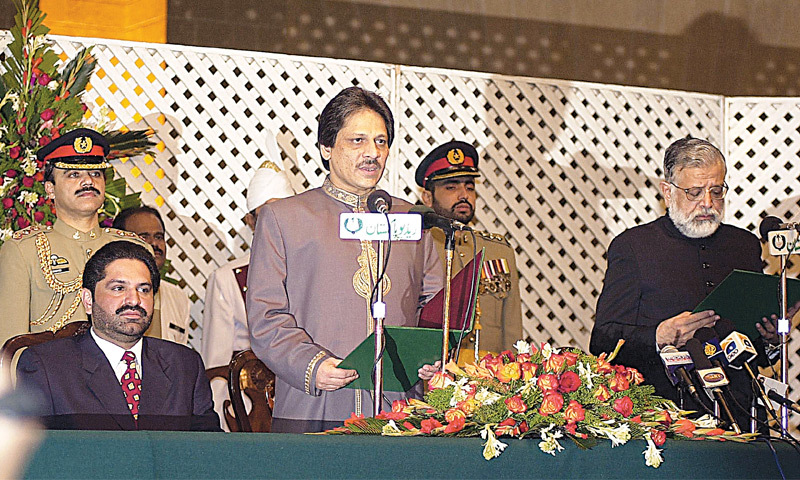IN a party where longevity eludes top-ranking leaders, Dr Ishratul Ibad of the Muttahida Qaumi Movement has proved that he is a survivor by being Sindh governor for the past 12 years. No predecessor of his had such a long stint in the gubernatorial office, though during this period he has had to thwart several attempts of his own party to get him replaced.
Until 2011, MQM leaders close to party supremo Altaf Hussain considered Dr Ibad ‘a man of crisis’ who could always be relied upon to come up to the expectations of the party chief. Not any more. They now privately accuse him of betraying the party, indulging in corruption for himself and submitting to the Pakistan Peoples Party for personal gains.
Take a look: With a decade-long stint, Ibad turns the corner
Dr Ibad began his political career as a worker of the All Pakistan Mohajir Students Organisation when he was studying in Karachi’s Dow Medical College. He contested the general elections in 1990 on a provincial assembly constituency as a candidate of the Mohajir Qaumi Movement-backed Haq Parast group and became a minister in the Jam Sadiq Ali cabinet. He went underground to avoid arrest after an army operation was launched against the MQM in June 1992 and surfaced a year later in London, where he obtained political asylum. While he was very close to Mr Hussain, he maintained a low profile in the MQM until 2002 when he became the acting convener of the MQM’s coordination committee after Mr Hussain removed then convener Dr Imran Farooq from the post.
As a representative of then president Gen Pervez Musharraf, Dr Ibad became Sindh’s youngest governor on Dec 27, 2002 following a power-sharing formula reached between his party, the MQM, and the then King’s party, the Pakistan Muslim League-Quaid, after the 2002 general elections.
Since then he has remained in Governor House no matter which party formed a government at the centre and, crucially, whether the MQM was part of it. Neither former president Asif Ali Zardari nor incumbent Prime Minister Nawaz Sharif felt the need to replace him with their party loyalists when they came to power in the 2008 and 2013 general elections, respectively.
A heavy smoker, Dr Ibad prefers to listen rather than speak and always keeps his cards close to his chest. He seldom responds to criticism. He never makes provocative statements. And, over the years, he has mastered the art of turning foes into friends. All three qualities make him totally different from his London-based leader.
While the constitutional office of the governor requires complete impartiality, Dr Ibad has never concealed the fact that he is an MQM nominee. It was Dr Ibad who during his early days as governor orchestrated an operation against the Muttahida’s nemesis, the Mohajir Qaumi Movement-Haqiqi, in 2003 to clear what were then described as ‘no-go areas’.
The MQM-H’s headquarters, Bait-ul-Hamza, in Landhi was demolished and the entire leadership was arrested during his first two years in office.
But unlike other important figures in the MQM, the soft-spoken and mild-mannered Dr Ibad, who will turn 52 in March, is always considered a moderate voice in the otherwise mercurial MQM and usually decision-makers in Islamabad and in the garrison city of Rawalpindi feel comfortable in dealing with him instead of making a direct contact with Mr Hussain or other leaders.
For about 10 years, he exercised full control over not only his party’s political affairs but also the administration of Karachi and Hyderabad. All ministers belonging to the MQM reported to him. He presided over late-night meetings with MQM leadership at Governor House with such regularity that some political parties accused him of having turned the palatial official residence into an MQM sector office.
But the situation began to change in 2011. In the past 12 years, Dr Ibad faced the wrath of Mr Hussain many times and at least on three different occasions the latter asked him to resign and return to London. But each time either his resignation was rejected or the powers who mattered persuaded Mr Hussain to retain him as governor.
His critics within the MQM say that a certain international power as well as ‘men in uniform’ came to Dr Ibad’s rescue when Mr Hussain tried to remove him from the post of governor in June 2011. They pressured Mr Hussain to the extent that after three weeks he himself asked Dr Ibad to return to Karachi and resume his responsibilities. But after that incident the MQM leadership no longer considers him ‘our own man’. They now call him ‘their man in Governor House’.
Even Mr Hussain was reported to have told a news channel that he wanted to replace Dr Ibad as governor but could not do so because it would make the army angry. And recently he clarified that Dr Ibad had resigned from the MQM and it was up to the federal government to retain him or not as governor.
However, Dr Ibad’s admirers — and there is no dearth of them within the MQM — give him the credit for steering the party out of several political crises, particularly the one after the May 12, 2007 mayhem in the metropolis when no party was willing to even talk to the MQM.
They say that although the MQM chief strongly opposed former chief justice of Pakistan Iftikhar Mohammad Chaudhry, the latter did not take any action against the MQM even after annulling the much-reviled National Reconciliation Ordinance just because of Dr Ibad.
“Dr Ibad is an asset for the MQM as he is acceptable to entire Pakistan. He is a tested and trusted leader and the current leadership should use his national and international contacts for the party’s benefit,” said a former office-bearer of the MQM.
Published in Dawn, December 27th, 2014












































